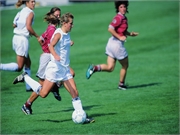- Could Your Grocery Store Meat Be Causing Recurring UTIs?
- Are You Making This Expensive Thermostat Error This Winter?
- Recognizing the Signs of Hypothyroidism
- 10 Strategies to Overcome Insomnia
- Could Artificial Sweeteners Be Aging the Brain Faster?
- Techniques for Soothing Your Nervous System
- Does the Water in Your House Smell Funny? Here’s Why
- Can a Daily Dose of Apple Cider Vinegar Actually Aid Weight Loss?
- 6 Health Beverages That Can Actually Spike Your Blood Sugar
- Treatment Options for Social Anxiety Disorder
Female Athletes Shortchange Themselves on Nutrition

Many female athletes lack knowledge about nutrition, which could harm their performance and put them at risk for health problems, a researcher says.
A review of two decades of literature on female athletes older than 13 found “a lack of general knowledge of nutrition among athletes, coaches and other sports team specialists,” said study author Mary Downes Gastrich, an associate professor at Rutgers University Medical School in New Brunswick, N.J.
“Other factors included poor time management and food availability, disordered eating behaviors such as chronic dieting or a drive for lower body weight,” Gastrich added in a Rutgers news release. “Some female athletes may purposefully restrict their calorie intake for performance or aesthetic reasons, while others may unintentionally have low energy expenditure due to increased training or lack of education on how to properly fuel themselves for their sports’ demands.”
She pointed out that the problem may be worse with particular sports and activities.
“In addition, specific sports, such as gymnastics, distance running, diving, figure skating and classical ballet emphasize a low body weight; thus, making these athletes at greater risk for inadequate calorie consumption, poor body image, disordered eating or a serious mental health disorder diagnosis of an eating disorder such as anorexia nervosa or bulimia nervosa,” Gastrich said.
When nutrition doesn’t meet the needs of energy output for sports or for proper body function and growth, female athletes’ bone and reproductive health can be affected, she warned.
“Deficiencies in vitamin D, zinc, calcium, magnesium and B vitamins can occur from exercise-related stress and inadequate dietary intakes,” Gastrich said.
And these deficiencies can have long-term effects. “Recent reports suggest that up to 42% of female athletes have insufficient vitamin D levels and up to 90% fall short of the adequate intake for calcium. These two deficiencies can increase the risk of bone stress fractures and also place these athletes at risk for osteoporosis later in life,” Gastrich noted.
She suggested it’s up to doctors, dietitians, psychologists, coaches and parents to monitor and counsel female athletes to ensure they’re getting a proper overall diet.
The review was published recently in the Journal of Women’s Health.
More information
The American Academy of Pediatrics offers advice on safeguarding the health of young female athletes.
Source: HealthDay
Copyright © 2026 HealthDay. All rights reserved.










